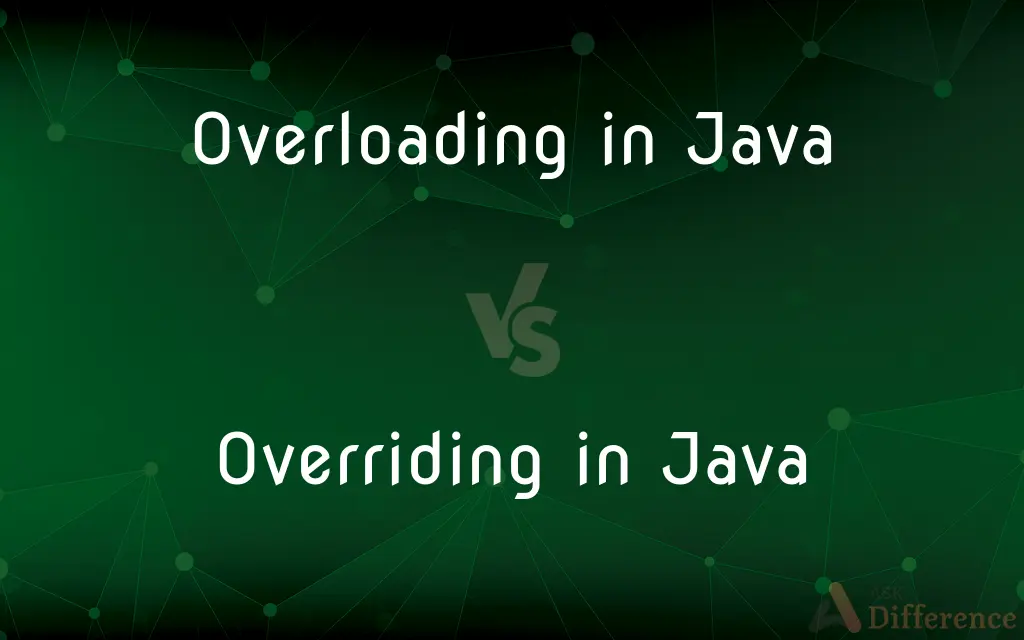Overloading in Java vs. Overriding in Java — What's the Difference?
By Tayyaba Rehman — Published on November 20, 2023
In Java, overloading allows multiple methods to share a name but differ in parameters, while overriding ensures a subclass method retains the same name and signature as in its superclass.

Difference Between Overloading in Java and Overriding in Java
Table of Contents
ADVERTISEMENT
Key Differences
Overloading in Java allows a class to define multiple methods with the same name, but with different parameters. It enhances method readability and allows a class to perform different actions depending on the number of arguments or their types. On the other hand, Overriding in Java is when a subclass provides a specific implementation for a method that is already defined in its superclass. It allows a subclass to inherit the visible fields and methods of its superclass, but also to override or specialize them as needed.
Overloading in Java is determined at compile-time. This is because the method that needs to be executed is determined by the method signature which includes the method name, and the number and types of its parameters. Overriding in Java, however, is determined at runtime. This is because the method in the subclass has the same name, return type, and parameters as the method in the superclass.
In Overloading in Java, the return type of the methods doesn't play a role in differentiating the methods, meaning two methods can have the same name, same parameters but different return types, and they won't be considered overloaded methods. In Overriding in Java, the overriding method in the subclass should have the same name, return type (or subtype), and parameters as the method in its superclass.
Overloading in Java can occur within the same class or in a subclass, meaning that a subclass can overload the methods inherited from its superclass. Overriding in Java, however, specifically deals with two methods, one in the parent class and the other in the child class, where the child class method is considered an overriding of its parent class method.
In essence, Overloading in Java is about adding versatility to methods within classes. It's like giving one name to different tasks based on input parameters. Overriding in Java is about control and predictability, ensuring that a child class can offer its unique spin or take on a method already defined in its parent class.
ADVERTISEMENT
Comparison Chart
Definition
Multiple methods with same name but different parameters
Subclass method with same name, signature as superclass
Determination
Compile-time
Runtime
Return type role
Doesn't differentiate methods
Must match or be subtype in subclass
Occurrence
Within same class or in subclass
Between superclass and subclass methods
Purpose
Versatility based on parameters
Modify/specialize superclass method in subclass
Compare with Definitions
Overloading in Java
A feature that allows a class to have more than one method with the same name but different parameters.
In a math class, the method calculate can be overloaded for different mathematical operations.
Overriding in Java
When a subclass offers a specific version of a method that's already provided by its superclass.
If Animal class has a method sound(), a subclass Dog can override it to provide its specific implementation.
Overloading in Java
Using one method name with different signatures to perform varied tasks.
Display(String name) and display(int age) are overloaded methods.
Overriding in Java
A feature that lets a child class provide its implementation for an inherited method.
In a class hierarchy of Vehicle -> Car, the startEngine method can be overridden by the Car class.
Overloading in Java
A technique to give multiple meanings or forms to a method by changing its argument list.
The method area() can be overloaded to compute the area of a circle, rectangle, or square.
Overriding in Java
A runtime polymorphism technique where a call to an overridden method is resolved at runtime rather than compile-time.
Calling the speak() method on an Animal reference pointing to a Cat object will invoke the speak method of Cat.
Overloading in Java
Providing more than one definition for a method within the same class by varying its parameters.
You can have print(int a) and print(double a) in the same class.
Overriding in Java
Modifying or updating the inherited behavior of a superclass in a derived class.
In a GUI library, a generic Widget class might have a draw() method, which can be overridden in a specific Button subclass to draw a button.
Overloading in Java
A way to improve the readability of a program by having a single method name performing similar tasks based on parameter differences.
The draw method can be overloaded to draw a circle, rectangle, or line based on provided parameters.
Overriding in Java
Ensuring that a subclass method has the same name, return type, and parameters as the method in its parent class.
If the Person class has a method displayInfo(), a subclass Student can override it but must keep the same signature.
Common Curiosities
Why use Overriding in Java?
To allow a subclass to provide its specific implementation of a method defined in its superclass.
Can static methods be overloaded in Java?
Yes, static methods can be overloaded based on the number and type of parameters.
Can static methods be overridden in Java?
No, static methods belong to the class and not an instance, so they can't be overridden.
How about Overriding in Java? Compile-time or runtime?
Overriding is determined at runtime.
What's the main purpose of Overloading in Java?
To allow a class to have multiple methods with the same name but different parameters.
Can constructors be overloaded in Java?
Yes, constructors can be overloaded with different parameters in the same class.
Is Overloading in Java determined at compile-time or runtime?
Overloading is determined at compile-time.
Do overridden methods in Java have the same signature as the superclass method?
Yes, overridden methods have the same name, return type, and parameters as the superclass method.
Can overloaded methods have different return types in Java?
Yes, overloaded methods can have different return types, but the return type alone doesn't differentiate them.
Does Overloading in Java depend on the return type of methods?
No, overloading is independent of the return type of methods.
Can constructors be overridden in Java?
No, constructors are unique to a class and cannot be overridden.
In Overriding in Java, can the return type be a subclass type?
Yes, the overriding method can have a return type that is a subtype of the return type declared in the overridden method.
Share Your Discovery

Previous Comparison
Acetylation vs. Acylation
Next Comparison
East Coast Rap vs. West Coast RapAuthor Spotlight
Written by
Tayyaba RehmanTayyaba Rehman is a distinguished writer, currently serving as a primary contributor to askdifference.com. As a researcher in semantics and etymology, Tayyaba's passion for the complexity of languages and their distinctions has found a perfect home on the platform. Tayyaba delves into the intricacies of language, distinguishing between commonly confused words and phrases, thereby providing clarity for readers worldwide.












































